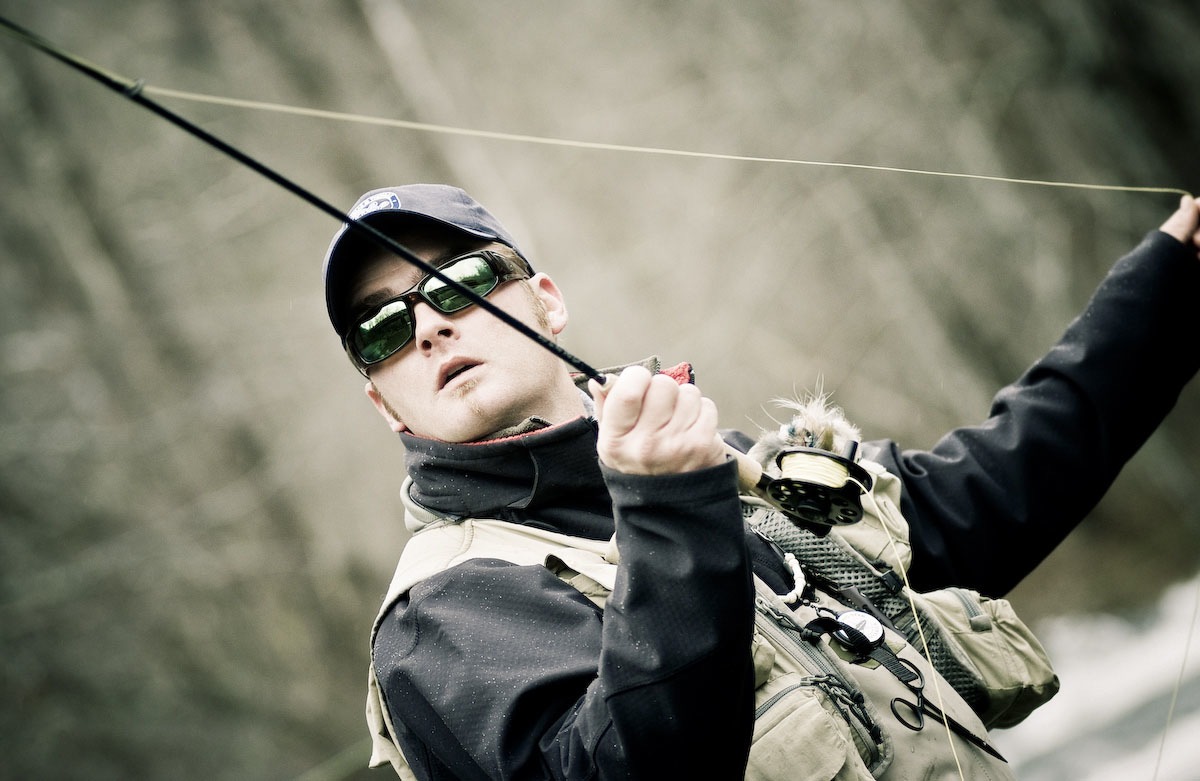By Kent Klewein
No fly angler should ever feel ashamed to watch his/her back cast when trout fishing.
In fact, if you make a habit of consistently watching your back cast, you’ll become a much better fly caster overtime and catch a good deal more fish when you’re on the water. Just because Brad Pitt in the movie, A River Runs Through It, didn’t watch his back cast in most of the fly fishing scenes throughout the film, doesn’t mean fly anglers should follow his lead. The best fly casters in the world watch their back cast when presentations call for it. They might not do it all of the time, but they sure as heck don’t think twice about doing so, when a specific presentation calls for it.
The reason I’m taking the time to talk about this today is because most of my clients struggle with the idea of watching their back cast. From my point of view, they shy away from doing so, because they feel like they’re raising up a red flag that signals, “Hey everyone, I’m a rookie.” But that notion is completely untrue. In reality, if a more advanced fly caster walks up on you and you’re casting poorly because you’re not watching your back cast, he or she is probably going to be thinking, “That poor angler, all he/she needs to do is make an effort to watch his/her backcast and most of those casting flaws would disappear.” If you’ve hit a plateau with your fly casting skills, more times than not, the best thing you can do to take your skills to the next level is start paying more attention to watching your back cast. Put it to the test next time you’re on the water especially if you’re a newcomer or intermediate fly angler. And don’t think it only applies to trout fishing in freshwater, it can be just as important, sometimes even more important, when fly fishing in the salt.
4 Reasons Why Watching Your Back cast Can Improve Your Fly CAsting and Fishing
1. You’ll stay out of the overhanging trees and other stream bank foliage.
2. Your Timing will be much better, and better timing means less knots, more distance, and increased accuracy.
3. When making backcast presentations you’ll be able to aim more effectively because you’ll know where your fly is at all times during your false casting.
4. You’ll be able to diagnose casting flaws much easier because you’ll be able to compare your forward cast and your back cast to each other.
Keep it Reel,
Come fish with us in the Bahamas!
Kent Klewein Gink & Gasoline www.ginkandgasoline.com hookups@ginkandgasoline.com Sign Up For Our Weekly Newsletter!

I asked a casting instructor this question at a clinic last year. He said “with a back cast that ugly, I wouldn’t”. Never did get a straight answer. Does this apply for salt?
Are you sure that guy was a casting instructor and not a stand-up comedian? Watching your back cast is important to the learning process. In saltwater fishing, however, you should not be watching your back cast. You need to keep your eye on the fish at all times. That way you can judge his behavior and make the adjustments necessarily for a good presentation. Saltwater fish are generally moving and it’s easy to lose them if you’re looking back over your shoulder.
Right on the fish will let you know there interest or lack of and what you need to do next if not a hook up, you have to maintain your visual with the target at all times, I have never caught a fish in the air behind me
Thanks. “How’s your back cast?” Should be the first words said when someone asks for help casting. Instead I hear people jump straight to rod/line/leader/tippet/fly/wind/fish….. All those are important, but managing the back cast has more influence than tweaking of the above.
I think one reason some people are hesitant to watch their backcast is because turning your head (or upper body, for older people or people with injuries which limit their movement) changes the kinetics of the cast.
My first single-hand casting instructor actually told us not to watch our backcast for that reason. Fortunately, my cast was bad enough that I got over that habit!
If you suffer from vertigo or inner ear problems, this can be a problem. Somehow, I’ve overcome this in all but low light situations. Night fishing…fagettaboutit!
I did learn that confidence is part of the game, just like fly selection. Also, learning to turn my body, and not my head helped
And, since 80 to 90% of my fishing is done with a switch or Spey rod (for another reason), problem solved.
That said, constant reappraisal, and self diagnoses are essential to maintaining good casting technique.
Watching the back cast is good when practicing, but when I’m fishing in both salt, and for trout, I like to keep my eye on the fish or the spot I want the fly to land. It’s just too easy to lose sight of the target in that moment you focus on the back cast.
I guess it would be different if I was fishing the water, but I live in NZ, and most of my fishing is to fish I can see. Same with the permit fishing I do.
I fish from a kayak in salt marsh most of the time, so I don’t feel that turning my head to see the backcast is a good idea. If I am on the bank at a pond or practicing in a park then I’ll do it.
Watching your back cast is a terrible habit. It will cause your mechanics to change and if your back cast is messed watching it won’t fix it any different than not watching it. I’ve fly fished for 30+yrs and taught many and shown people watching their back casts how it doesn’t help. Keep your eyes where you want to put your line, if you watch the water you will feel a good cast and you will feel bad ones. Watching it won’t fix it, fixing your issue will. Have confidence and stand up straight and tall and don’t get lazy and let your arm fall on the power cast.
Actually, it was Gary Borger’s son who was the stand in for Brad Pitt and since he was casting since a toddler, he doesn’t have to look back 🙂 . I am a firm believer that it is ego or possibly a physical impairment are the only valid reasons not to watch the back cast. Muscle memory is linked to vision i.e. just ask a pro baseball player to close his eyes before the pitch is thrown. In my non pro opinion, to purposely instruct people learning not to look at the back cast is irresponsible. I have pulled a hook out of the victim who I fished with was taught not to look back. Yarn and glasses is the answer while learning to fly cast thus watching and learning will be maximized before heading out on the water. Any certified instructor will teach that watching the back cast as it is one of the key points for improvement and consistency. In the certification process to have matching back and forward casting loops is paramount from what I am learning.
Pingback: Tippets: Cards for Rivers, DIY Yarn Indicator, Watching Your Backcast | MidCurrent
Just changed my casting form somewhat so I could easily watch the back cast without getting vertigo and falling on my arse beginning with a more canted rod as well as a much lower path (reel is rarely going above the chin) also started shifting my weight and body with the rod. My casting improved dramatically with these few adjustments. Considerably less energy expended, tight arrow shaped loops on front and back cast and way less movement of the rod arm. I am no casting expert but do practice ALOT (self taught doing it the wrong/hard way) and am now consistently throwing 60- 70 feet of line with little to no effort (I know that is nothing to you pros but super tight loops at 70′ for me is like drinking nectar from the gods) Definitely a believer!